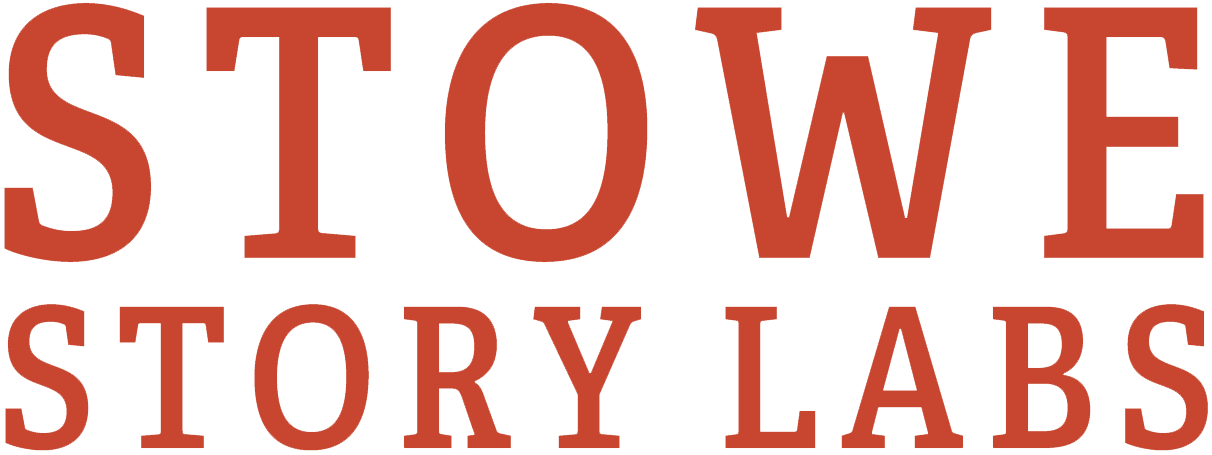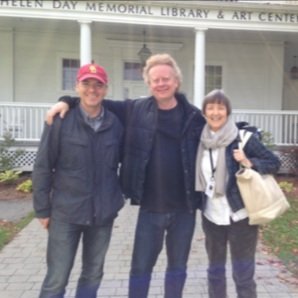Being Sensitive to the Life of the Mind
ELLEN PARKS ON TEN YEARS OF MENTORING WITH STOWE STORY LABS
By Robert Delaney
Ellen Parks Mentoring at 2018 Stowe Writers’ Retreat. Photo by Jesse Schloff
Ellen Parks is a foundational mentor to Stowe Story Labs. Since the Labs’ first foray in 2013, Ellen has generously shared her experience for the benefit of fellow creatives. This generosity has been a boon to artists lucky enough to cross paths with the iconic NYC-based casting director.
Ellen’s storied career began not in casting, but as an actor on the stage. She credits her acting background with laying the groundwork for her later career as a casting director.
As a casting director, Ellen has worked with filmmakers such as George A. Romero, Martin Scorsese, Joel and Ethan Coen, Alexander Payne, and David O.Russell, Ellen has cast well known actors in some of their earliest roles. Such talents include Scarlett Johansson, Philip Seymour Hoffman, MaCaulay Culkin, Vera Farmiga, and Maggie Gyllenhaal. Ellen has worked on a wide range of projects: from large studio films, the smallest indies, to widely acclaimed projects like SIDEWAYS.
It all goes back to acting. “Acting kind of trained me for the general experience of the art. Trained me deeply in lots of different ways and lots of different techniques. It was also a process which started when I was very young, when I was 13. It moved me through a couple of eras in my life, and helped me to develop in a personal way as well as a professional way.”
The skill set that she developed through acting allowed for an organic transition into the world of casting: “The transition was just the flow of life for me. I had some skills, the ability to perceive and to receive impressions of what I was looking at. I had a sense of context and I had also learned the language of the art. So it was a natural transition for me and something that I enjoyed a lot and something I could progress in quickly.”
And process quickly she did. Ellen was given greater responsibility and trust early in her career, and through these early experiences, she was able to hone in on the fundamental powers of cinema as an artform:
“I discovered something tremendously important, ongoing in my life and career, which was the element of the camera. I had never done any film or television as an actor. But in a casting position, I was behind the camera and could see through the camera’s lens what an extraordinary vision it had. What it was able to reveal that theater did not reveal. What it enabled the audience to see both on a monumental scale, and also on an extraordinarily privileged intimate scale.
Chris Millis (L), David Pope (M), Ellen Parks (R) during inaugural Stowe Narrative Lab
“What that enabled the writer, the creators of the materials, to develop, to give to the audience, was of course about humanity and the human story. But also looking at the macrocosm and the microcosm. Looking at greater issues, being able to depict much more landscape and territory than a play was, and looking with great precision and incisiveness at the landscape of human’s inner life.”
“That was very intriguing to me. That was a real revelation. I grew up in a family that was deeply arts related. I was introduced to a lot of different versions and forms of art. And this just came together very well for me. To see this particular art which involved the creative colleague of the camera. This was the one I felt was most fascinating.”
Cinema is such a collaborative medium, and Ellen as a casting director has had a key role to play in how the artistic vision develops between screenwriters, directors, and actors. She explains that in her role, communication and understanding is key.
“In casting it’s often our task to bridge those various types of people and to have them all be speaking the same language. When I first get a script, my obligation is to get inside the writer’s mind as deeply as I can. If I don’t understand something we have to continue our conversation until I do so I can act on their behalf with the performers. To get the right people for the right roles and to know who’s capable of bringing more than they imagined. That’s really both fun to do and I think significant.
It is not only being able to understand one another that is important to Ellen, but to be able to empathize with each other on a film set.
“The ability to be sensitive to the life of the mind, which the camera is so good at representing. The inner lives of the actors who play them. And how all of those things coalesce. How the actor is able to see deeper than let’s say an ordinary off-the-street human person. Because this is what they study, this is what writers study and give them to interpret and reveal.”
One of the situations that felt most fruitful to her was working with the Coen Brothers, which exemplified the sense of collaboration and vision that she explained above.
“I loved the way they allowed each of their pieces of writing to be a different world to be inhabited by very specific characters. That they were looking for the actors who could live in that world, rather than sticking big names into those roles and trying to force it.
“That’s the type of collaboration I love the best, because my participation on that team allowed really miraculous, wonderful discoveries to happen. That is a process that requires the writer/director to be open and to really be looking. Requires me to understand what their intent is, what the world is that they’re creating, what matters to them, what they see and want the audience to see and feel and hear and resonate with. It’s a really nice balance.”
Alongside her role as a casting director, is her work as an acting coach, which has been an incredibly rich experience for her as well.
“I’ve been coaching for as many years as I’ve been casting. They’ve run concurrently and served each other very well. The coaching has taken me on sets for the duration of the film. Which has been a remarkable learning experience for me and really deepened my understanding of what an actor goes through. It’s also been, as the title certainly suggests, something that’s done in a one on one setting and often it’s working with somebody over time, from let’s say age 12 to age 21. For someone like me who has not had children of her own, that’s a really precious experience for me because I need to shift and change my approach as the individual in front of me is growing and getting to know themselves, letting go of certain things and embracing other things.”
She has also utilized her coaching skills as a way to help new voices in the film industry.
“BIPOC and LGBTQIA actors are increasingly under consideration by the industry for more substantial and meaningful roles these days. In the past they may not have had a lot of experience or opportunity to grow their skills and explore. Some are seeking more training and practice in order to do well in the audition environment, so I’ve been helping them build their confidence and strength and get “camera ready.” This is both a privilege and an educational opportunity for me. I’m glad to be able to contribute to their continuing success.”
With her experience in coaching, casting, and acting, Ellen brings a unique perspective to Stowe participants. As a founding mentor to Stowe’s programs, she has continuously contributed so much of her time and wisdom to the participants' projects.
“It’s been an incredible blessing, an eye opening experience.
“At the point that I was brought on board I had some wonderful times in the industry but I’d also had some deeply disturbing times in the industry. The latter came about through dysfunctional behaviors of people in power and those who worked with them and for them. How imprisoning that was, how disabling that was for anybody working on a project with them.
“What David Rocchio offered from the very beginning, Rocchio and then I got to know David Pope as we began to roll forward, what they offered was the obverse. And they have been so consistently true to their ideals and to their vision and to the development of their programs. What they do has always been immune to the toxicity in the business. They’ve made such beautiful choices in bringing on board people who care about things in the same way. So I’m just extremely grateful that it exists and I’m still invited to participate.
“There’s so many things in our world and in our lives right now that look so dire and dark. It looks like the way you win is to be massively destructive and dysfunctional. And Stowe represents something different. Something different entirely. I’ve not been on the receiving end as much as the writers have, but it seems from the feedback I hear that this really works. This is really so important. ”
“Ten years collaborating with Ellen – one who is so deeply knowledgeable, experienced, and insightful about the creative process, cinema, and the film industry – has been one of the great joys of building the labs,” said founder and director David Rocchio. “Ellen is invaluable to our mission of supporting top emerging creatives, and I look forward to sharing the experience with her yet again this June,” he said. “I can’t wait.”
Robert Delany is an Academic Intern with Stowe Story Labs. He graduated in 2020 with an MA in cinema studies from NYU and was a Program Associate for the 2020 Flickers’ Rhode Island International Film Festival, where he now conducts interviews for their “Filmmaker Spotlight Series”. Robert also writes for Split Tooth Media, an independent film and music publication based in Portland, Oregon. He is currently acting as a researcher on the film ASCO: WITHOUT PERMISSION, directed by Travis Gutierrez Senger and produced by North of Now. He was also an Office Assistant at Senger’s production company, Asa Nisi Masa Films, where he focused on the development of numerous projects. Robert graduated in 2018 with a BS in film and TV from Boston University’s School of Communication. Robert Delany was selected for this academic internship to focus on interviews and other writing for The Story Board, Stowe Story Labs’ bi-monthly newsletter. He will also assist in the establishment of a curated short film platform for Stowe Alumni.



